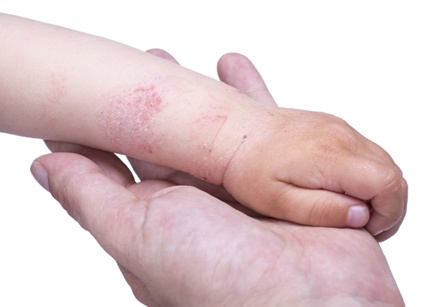Atopic dermatitis, also known as eczema, is a chronic skin disorder that produces itchy rashes and scaly.
This condition occurs mainly among infants may begin between 2 and 6 months of life, and often disappears into adulthood. For those who suffer from atopic dermatitis is common to also suffer seasonal allergies, asthma and skin allergies.
It is basically a skin disease characterized mainly by dry, scaly and itchy skin that tends to evolve in outbreaks, moments in which the symptoms are much more annoying. There is a treatment that will help in your healing, although periodic and sustained care helps to protect the skin and reduce its most troublesome signs.
Causes of atopic dermatitis
The causes of the eczema still keep on being investigated, but it is known that it wets itself as a result of a reaction in the skin that generates swelling and redness. In general, patients with atopic dermatitis have greater sensitivity because their skin lacks certain proteins. Often there is a family history of certain related allergies such as asthma, also from eczema and allergic rhinitis.
It is also known that there are certain factors which worsen the symptoms of atopic dermatitis. Some of them are:
- Certain allergies (pollen, dust mites, mold).
- Colds and flu.
- Contact with irritants or rough materials (i.e. wool) and chemicals.
- Dry skin.
- Stress.
- Sudden changes in temperature.
- Perfumes and dyes in lotions or soaps.
Symptoms of atopic dermatitis or eczema
The symptoms are clearly visible, since it arises on the skin. Some alterations of the skin that can occur in patients with dermatitis are:
- Blisters that form scabs.
- Redness or swelling with blisters.
- Dry the whole body.
- Protuberances (mainly behind the arms or on the front of the thighs).
- Changes in skin color.
- Thickening of the skin (takes leather look).
Also these symptoms with secretions or bleeding can accompany in the ear.
Treatments for atopic dermatitis
For the treatment of atopic dermatitis it is very important to implement a series of daily care, which will reduce symptoms and therefore need for medications.
Before the itching that causes the rash we must try to avoid scratching. For this the use of moisturizing or other ointments such as petrolatum, a topical steroid cream or other cream that recommend your doctor.
It also helps the intake of oral antihistamines, our doctor will tells us what and how much doses are appropriate. To sleep we recommend using soft gloves and keep your fingernails short so that scratching is not as strong. The bathroom should be short and with fresh water using mild cleaners and soft bath gel.
Do not use products on skin containing alcohol, fragrances, dyes or other chemicals. Avoid factors that increase symptoms, among them we can mention, eggs, wool clothing, soaps or harsh detergents, chemicals, solvents, sudden temperature changes.
The drugs used to treat atopic dermatitis are oral antihistamines, topical drugs (creams or ointments applied to the skin) with cortisone; although according to the particular case of each patient can be combined with other medications according to the health professional. There are also treatments such as phototherapy using ultraviolet (UV).
